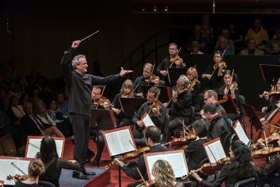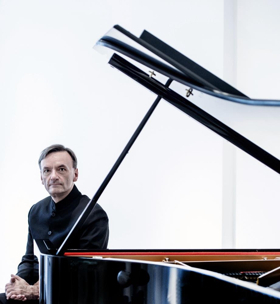Review: I Like MOZART. Does That Make Me a Bad Person?

Festival Orchestra. Photo: Kevin Yatarola
Lincoln Center's MOSTLY MOZART FESTIVAL is over for the season and finished up* with a program that was an oddity because it wasn't mostly Mozart (or no Mozart) but all Mozart. After hearing the Festival's performances of Bernstein's MASS and Ashley Fure and Adam Fure's THE FORCE OF THINGS, I was happy to be back in the bosom of the festival's namesake.
Well, hooray for the 18th century. Does that make me a bad person?
The program had much to offer: wonderful singing, a brisk baton and performance from Music Director Louis Langree heading the Mostly Mozart Festival Orchestra and a piece that's hardly ever performed. It also gave me an introduction to a pianist who is no newcomer but whom I somehow have managed to miss in my years of music-going in New York and beyond.
The evening kicked off with the six-minute oddity, "Meistermusik." But make no mistake: This was no trifle but a meaty piece of music that gave us much more than we possibly could have expected in such a short time--even from Mozart. The piece was written in the summer of 1785 for an installation ceremony (according to the program notes) or the funeral of a fellow Freemason (as described in other documents). Whatever the case, the piece is gorgeous and should be performed more often, now that it has had this showcase.
It features brilliant choral writing--bleak as some of it is, using a Greogrian chant melody associated with the Lamentations of Jeremiah--performed here by a splendid chorus of tenors and basses from the Concert Chorale of New York, under James Bagwell. While Mozart, a master of recycling, used the music as the basis of his "Masonic Funeral Music" (K.477)--honoring two other Freemasons--later in the same year it did not feature the male chorus, which, judging from this performance, was a loss.

The first half of the program finished with Mozart's Piano Concerto No. 21 in C major, also from 1785, performed by Stephen Hough (pronounced Huff). The British/Australian Hough is described widely as a polymath--his trip to New York also took time for a reading from his new novel at the Lincoln Center branch of the New York Public Library--but this is definitely not one of those "master of none" instances.
He gave an insightful reading of the concerto--still known as "the Elvira Madigan" from its use in a '60s Swedish film mainly remembered... for using the andante movement of the concerto--whipping through it at warp speed and providing his own cadenzas. He's certainly an original and it was an interesting performance, even if some of his contributions seemed a bit odd and the andante sounded...I hesitate to call it "less Mozartean" than the rest and somewhat out of place, even as it echoed the theme first presented by the orchestra. He felt right at home with the Schumann encore from Kinderszenen as well and I look forward to hearing him again.
The centerpiece of the program, of course (with no slight to Mr. Hough), was the Requiem that Langree, the orchestra, chorus and soloists delivered in a blistering performance. It's amazing that the composer was on his last legs as tried to finish it and there are all kinds of apocryphal accounts of his final days, including his dictating the music to Salieri (from the film AMADEUS), his wife and others performing excerpts as he lay dying, and his giving instructions to his student, Sussmayr, on how to finish it.
All that is known definitively is that he wrote only the opening Introitus--which sent chills in the well-tempered performance from the Concert Chorale--as well as much of the Kyrie that followed. Beyond that...who wrote what is a big question mark. Would it have sounded different if Mozart had finished it himself? Of course. Nonetheless, the piece manages to hold together amazingly well on stage, considering how many hands purportedly touched the work that we hear today. Who wrote many of the sections--the thrilling Dies irae and profound Lacrimosa--is something we'll never know but, does it matter, really? We're glad to have them.
The four soloists were marvelous. The lush, soaring soprano Jodie Devos (in her US debut) and burly bass of Ryan Speedo Green had the most opportunities to amaze us (his dialogue with the trombone in the Tuba mirum and his touches of MAGIC FLUTE's Sarastro, in particular, were of note), while the lavish mezzo of Jennifer Johnson Cano and elegant tenor Andrew Stenson had their own opportunities to add to the overall effect of the work. (Some of Stenson's work sounded remarkably like it might have been taken from Don Ottavio in DON GIOVANNI, written the same year.) Together with the chorus, they brought the performance to a stunning climax.
With the rearrangement of Geffen Hall--pushing the orchestra far out into the audience, with the soloists behind them in the Requiem (but Hough in front), and chorus in the rear--the performance of all three parts of the program brought us as close to Mozart as we could have wished. With the three different sides of the composer that were presented, one couldn't help but wonder, once again, where he might have gone if he'd lived past 35.
*The Festival actually closed the next day, with a Mark Morris dance program, set to Monteverdi, Brahms, and Schubert, which I considered outside my bailiwick.
Videos

